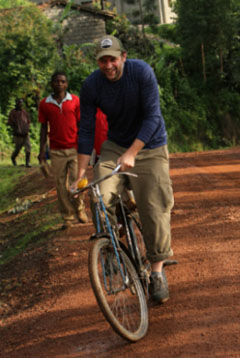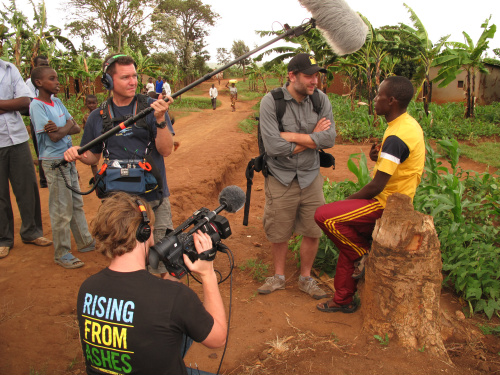AFF 2012 Interview: T.C. Johnstone, 'Rising From Ashes'
 Local director T. C. Johnstone's latest documentary shows the formation of Team Rwanda, a group of cyclists trained and coached by former professional cyclist Jock Boyer. Narrated by Forest Whitaker, Rising From Ashes checks in with Boyer and members of the first team in that hilly country over a period of about seven years.
Local director T. C. Johnstone's latest documentary shows the formation of Team Rwanda, a group of cyclists trained and coached by former professional cyclist Jock Boyer. Narrated by Forest Whitaker, Rising From Ashes checks in with Boyer and members of the first team in that hilly country over a period of about seven years.
Johnstone's film will screen Thursday 10/18 and Wednesday 10/24 as part of Austin Film Festival. I was able to view the film before it screens at AFF, and Johnstone answered some of the questions I had after my viewing.
Slackerwood: How did you know this team was starting up in Rwanda (or that there was interest in starting up a cycling team there?)
Johnstone: In 2005, I traveled to Rwanda with my friends Dan Cooper and Tom Ritchey. Tom was one of the inventors of the mountain bike and he wanted to ride in Africa. I brought my camera and we did a short film of the trip.
One morning we arrived in the parking lot to find 15 cyclists; Dan had met them on a previous trip. They rode with Tom for 100 miles and over dinner the idea of a team came together. They asked if I was interested in making a film about it. Seven years later, here we are!
How did you connect with Jock Boyer?
Johnstone: When the team first got started, we needed a coach. Jock and Tom had known each other since they were teenagers. They were more competitors than friends in the early years. [Jock] had recently retired and he was willing to give it a shot.
Do you think Jock started out with certain notions that were dispelled after time spent in Rwanda? It surprised me that he had little to no previous knowledge of the genocide there.
Johnstone: I have met a lot of people in 15 years of filmmaking and Jock Boyer is one of a kind. He has a unique gift of being able to focus on a goal and manage circumstances to find success. He is very deliberate with his choices. I saw that even a few years before we shot the film. I had met him with Tom in N. California.
It's always been interesting to me. He doesn't listen to the news and is very deliberate in choosing his mental input. In the beginning I didn't understand it, but over the years began to see in him, and probably more in the riders, what it takes to achieve success. In cycling it's such a mental game to overcome pain and suffering. The interesting part is he's very purposeful on his decisions and when it was the right time to learn about the genocide he fully put his heart into it in order to best coach the riders. I always found it fascinating he never used this a crutch when the riders didn't do well at a race. Since the beginning he never took pity on the riders but compassion.
How much time did you spend filming the team?
Johnstone: I've been working on the film for 7 years. This has been on and off depending on where the story was going. I have had a great team along the way. The only reason we have a movie is the people who have helped me get this finished. I can't emphasize that enough.
I’m also wondering how many hours of film didn’t make the cut. Was there anything specific you were disappointed you had to leave out of the final movie?
Johnstone: The first cut of the film was around 4 hours long, which was cut down to 90 minutes over 80 to 95 drafts. When I cut a movie, I edit every scene then cut it down. When I first began filmmaking, I remember how I would get so emotionally attached to footage. It's the death of many films, in my opinion.
Over the years I've learned just how important it is to do as many test screenings as I can with people I don't know. You never get real honesty until you get the general public.
Yes, there are LOTS of stories on the cutting room floor. We will begin posting lots and lots of this material on our YouTube channel over the coming months.
What equipment did you use to film Rising From Ashes? The colors are amazingly bright.
Johnstone: I started in narrative filmmaking and always loved movies that were photographed well. It's one of my core values to shoot my documentaries with a cinematic style. This often affects the pacing. When you slow things down, I feel it's my responsibility to give the audience something wonderful to look at.

We shot this film on nine different camera formats. The truth is, the cameras didn't make the film look great -- my cinematographers did. These guys know my style and I'm intentional about who I hire for every shoot. The camera is often the third decision. The first is what do I want the film to look like, the second is who can create this, then we choose the camera. I'm constantly looking for guys who are thinking outside the box. I watch 10 to 15 reels a week of DP's from around the world. If I see something I like, I'll call or email to tell them I like their work. I truly believe that is all about light and relationships.
How did you come to include a Von Trapp Children song in the soundtrack?
Johnstone: I really wanted music at that point in the film that was simple. I found the Von Trapp song, which is the Rwanda national anthem. It worked really well and the Von Trapps were gracious enough to allow us to use it.
Have you talked to Adrien [Niyonshuti, one of the original team members] since his race in the Olympics?
Johnstone: We talk all the time! He's one of my heroes. I'll know him for the rest of my life.
[Photos by John Russell, courtesy of the producers]

